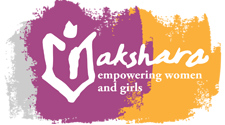Mapping Change in the Lives of Girls
Akshara has been focusing on multiple aspects of interventions with young women. Firstly, by supporting and ensuring that women continue their formal education and secondly by giving planned inputs helping them push their boundaries at the personal, the family and the community levels.
The Mapping Change Project was a participatory research cum evaluation to understand what kind of change has been possible and what aspects can be strengthened to make the empowerment of young women feasible.
We believe that young women have the agency to break the cycle of violence and poverty in their lives, help their families as well as build creative and productive lives for themselves. They know what is best for them and they are ‘experts’ in balancing, juggling and negotiating for opportunities and in the face of opposing values and forces. Based on these assumptions, we think that the young women we are working with, are the best partners in this research. This participatory approach has two distinct advantages. The tools for research will be formulated together and executed together by i.e. by the young women and Akshara staff. This democratic approach will ensure rich data and insights.
Our hypothesis is there is an inter-connection between young women’s ability to act as agents for social change in their own lives and in the community and their exposure and involvement in progressive and gender equality concepts.
Our focus will be on evaluating the Akshara program along with its beneficiaries and putting forward the strategies to other young women’s programs for an exchange leading to a reconfiguration of programs.
The Method:
We will explore and record the social change in the lives of women as they build their leadership skills. By social change we mean change at the level of their perspectives and actions which are reflected in their individual behaviour; views on gender equality; projected vision; relations with their families; and with other communities. Instead of interviews and questionnaires, we used
- Storytelling: give scenarios and letting the girls tell their own stories
- Photo journals: they were asked to photograph their families, their homes, civic amenities; their neighbourhoods and streets
- Personal Vision: they could explain their plans for life and work through songs, posters or poems
- Focus Group Discussions on marriage, restrictions at home and social taboos
The Impact
![When I arrived [at Akshara] I was very shy and wouldn’t respond even if I knew the answer because I lacked confidence. But in the years since I’ve been here, my levels of confidence have increased so much that I now take on leadership roles and speak even if not asked. I have the confidence to make decisions now - Pradnya](https://i0.wp.com/www.aksharacentre.org/wp-content/uploads/2017/12/pradanya-2.jpg?resize=64%2C150)

